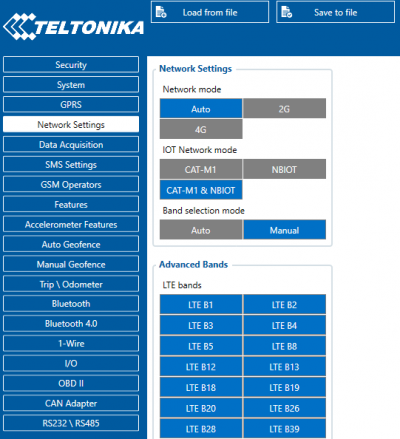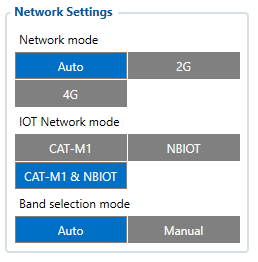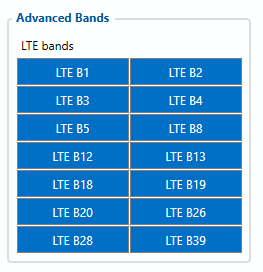Difference between revisions of "FMM130 Network settings"
| Line 62: | Line 62: | ||
==Operator connection== | ==Operator connection== | ||
<br> | <br> | ||
| − | + | The device saves to memory last seen operator and its’ network type. When there is no operator attached, the device tries to attach to the last seen operator on 4G IoT network mode. If the connection fails, the device clears last seen operator from memory and starts a new operator search. The same sequence happens when the preferred operator is given (configured), but instead of clearing the operator, the device each time connecting first tries to connect to preferred operator. | |
[[Category:FMM130 Configuration]] | [[Category:FMM130 Configuration]] | ||
Revision as of 08:18, 9 July 2020
Main Page > Advanced Trackers > FMM130 > FMM130 Configuration > FMM130 Network settingsNetwork settings
A device with external Quectel BG96 modem is named FMMxxx.
Quectel BG96 has different connection sequence from firmware side compared to other modems.
Network settings method is called on these occasions:
1. The modem is initialized.
2. The configuration has changed.
3. Periodically every 60 seconds after startup.
On each network, settings call changes are checked. The firmware sends configuration commands when they change. The on-device startup, all these commands are always sent as we don’t know whether they have changed.
LTE bands
Quectel BG96 modem has 14 LTE network bands. According to Quectel, each band can take up to 5 minutes to scan. To improve scan speed geographic bands have been implemented.
Geographic bands are functionality that sets (changes) configuration bands according to the device’s GPS location. Functionality is only active when band selection mode is “Auto”. It is run from network settings method (see above).
| Location | Abrevation | Bands set |
|---|---|---|
| the United States of America | US | B2 B4 B12 B13 |
| Europe | EU | B3 B8 B20 |
| Korea | KR | B3 B5 |
| Australia | AU | B3 B28 |
| The Middle East | ET | B3 B8 B28 |
| Japan | JP | B1 B8 B18 B19 |
| China | CH | B1 B3 B5 B8 B26 B39 |
Operator connection
The device saves to memory last seen operator and its’ network type. When there is no operator attached, the device tries to attach to the last seen operator on 4G IoT network mode. If the connection fails, the device clears last seen operator from memory and starts a new operator search. The same sequence happens when the preferred operator is given (configured), but instead of clearing the operator, the device each time connecting first tries to connect to preferred operator.


